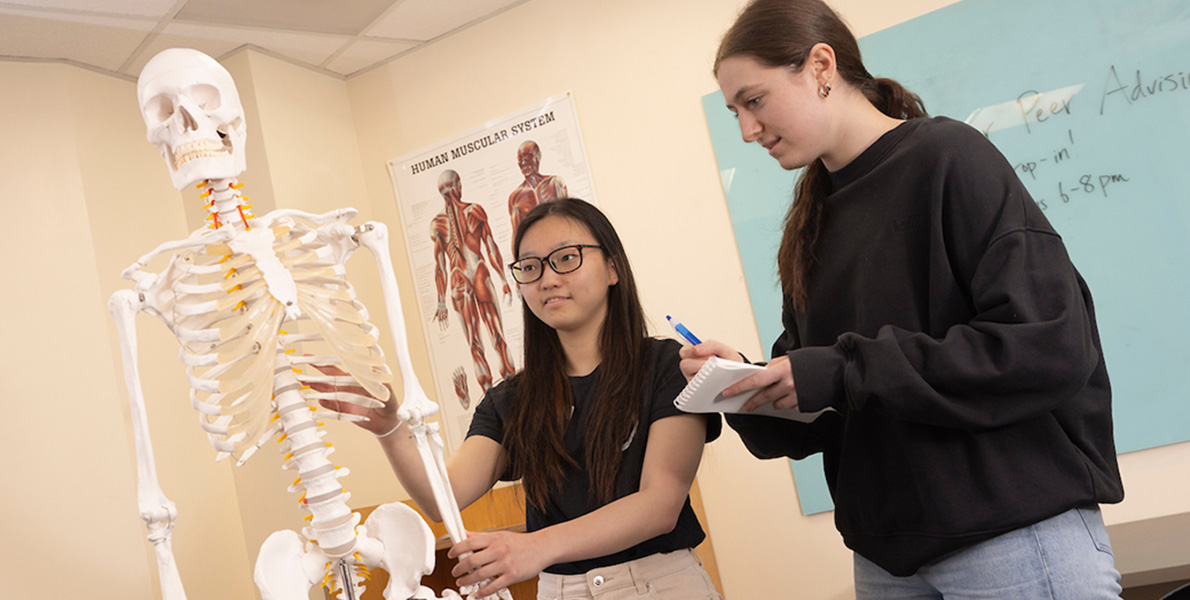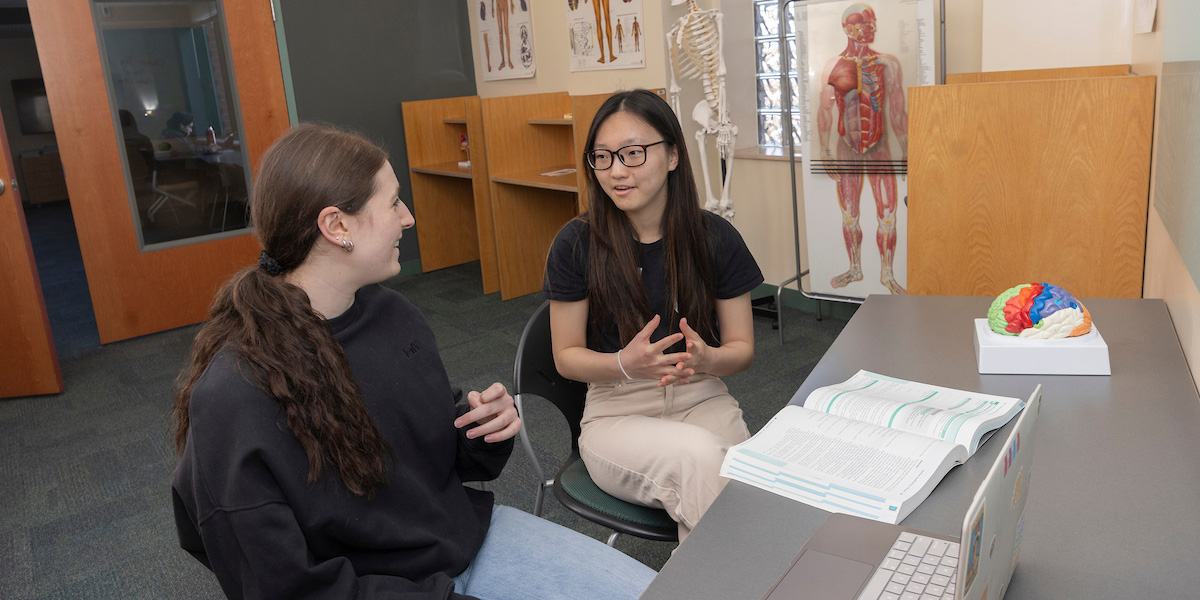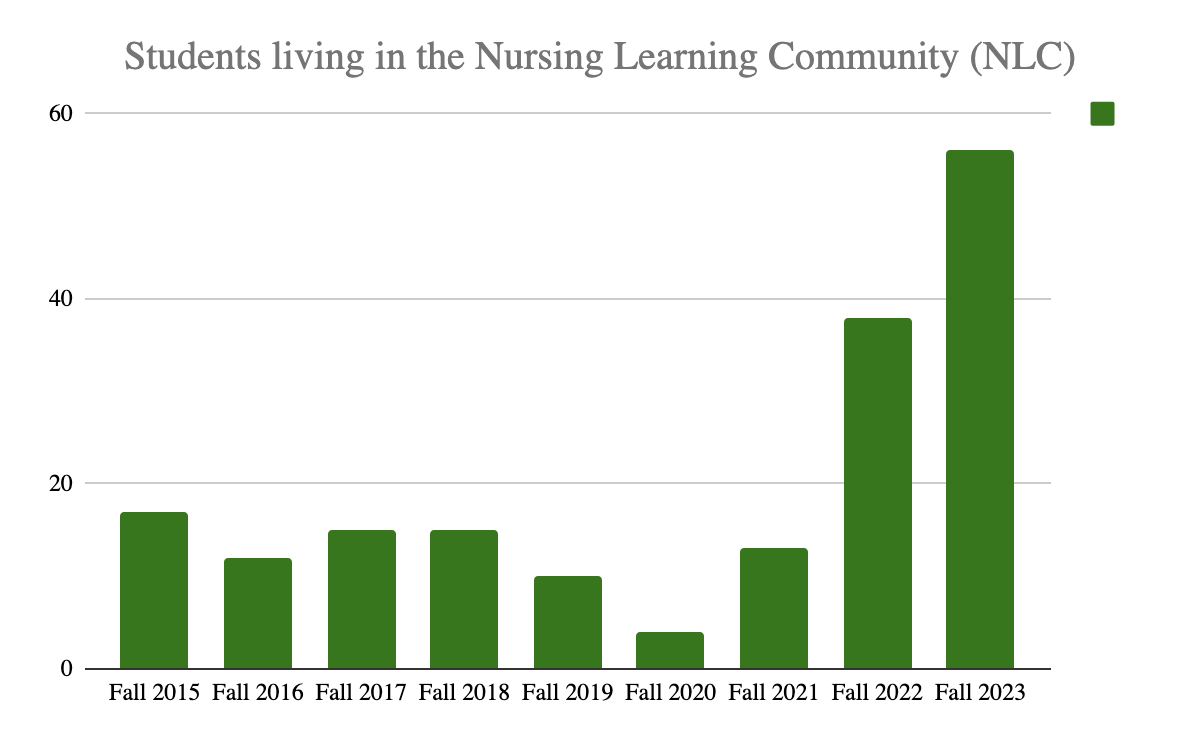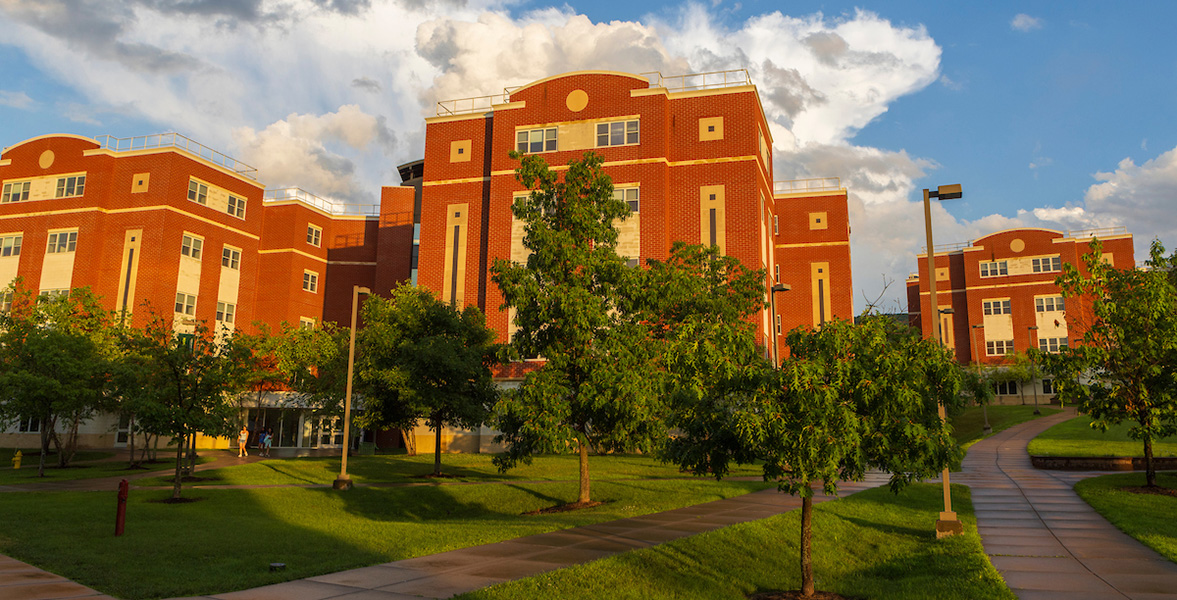How Decker College’s Nursing Learning Community helps students make friends, build connections
Living-learning community is a good fit for first-year nursing students

Where should I live on campus? Will I have anything in common with my roommates? How will I make friends?
For most young adults heading off to college for the first time, these are anxiety-inducing concerns. However, first-year students accepted into the Bachelor of Science in Nursing program at Binghamton University’s Decker College of Nursing and Health Sciences can bypass these worries by living in the University’s Nursing Learning Community (NLC).
The NLC is one of several learning communities across Binghamton’s Residential Life housing program. Every learning community features classes and experiences encouraging interaction and learning within that particular interest group. Students in each learning community live in the same residential college (Binghamton has six), typically in the same hall, and have opportunities to participate in group projects, workshops, events and field trips with others who share similar interests and goals.
Residents of the Nursing Learning Community live across two floors in Mountainview College’s Hunter Hall. They often take nursing prerequisite courses together and form study groups. In addition, staff from Mountainview’s Residential Life program and Decker College’s Division of Advising and Academic Excellence host academic and social activities and provide various student services. A dedicated NLC Study Lounge also offers tools supporting new nursing students’ educational needs.
“Being able to connect and live with other people going through the same challenging academic program helps the new nursing students bond as a cohort,” said Susan Briggs, associate director of Residential Life. “Decker College provides special programs to draw the students together as a community. The students living in the Nursing Learning Community also have access to resources and faculty that they might not have if they lived outside the community.”
Creating a community
While first-year nursing students may choose not to live in the NLC by contacting Decker’s Division of Advising and Academic Excellence, Decker’s academic advisors encourage incoming students to live there.
“During the first and second years of the nursing program, students often feel disconnected because they’re not on the Health Sciences Campus [home to Decker College], and they’re not taking nursing classes yet,” explained Courtney Wheeler, engagement and events coordinator in Decker Advising. “Living with other nursing students and participating in special activities and programs in the NLC helps the students to feel part of the nursing program.”
Of the 85 first-year students admitted for the 2023-24 academic year, 38 chose to live in the NLC. Additionally, this year, for the first time, sophomores who previously lived in the NLC were permitted to remain in the learning community if they desired.
Briggs said allowing second-year nursing students to live in the NLC helps incoming students develop relationships with those who are more experienced and fosters mentoring opportunities.
A place for support and study
The NLC Study Lounge is open 24/7 for quiet individual or group study. In addition to providing one of the most beautiful views of the Vestal campus, the lounge is decorated with anatomy posters and nursing textbooks are scattered on the tables. Students can also access anatomy models and a skeleton from a locked area at certain times during the evening.
Huilin (Kelly) Li is a sophomore nursing student and a peer advisor at Decker College who provides drop-in advising hours in the NLC Study Lounge every Monday night. She lived in the NLC as a first-year student and chose to remain there this year.
“Living with other nursing majors last year was really helpful since we took the same classes and went through similar experiences,” Li said. “Staying up late studying for difficult classes helped us bond. It was one of the main reasons I made so many friends as a freshman.”
Li’s positive experience motivated her to become a peer advisor.
“I received a lot of support from other nursing students and mentors who made my first semester a smooth transition into college, and I wanted to do that for others,” she added.
During peer advising in the lounge, Li often talks to students about time management and dealing with academic challenges. And while students sometimes come in solo, she said small groups frequently visit the lounge to ask questions.
“Rather than a one-on-one session, it is more of a group conversation about how to survive nursing or discussing what classes to take and what others’ experiences have been,” Li said.
Student staff help build connections
Meghan Cleary and Lindsey Sheeley work as community assistants for Binghamton’s Residential Life program. Each is responsible for a different floor in Hunter Hall, but they work together since most students they support are part of the NLC. Both are third-year nursing students; Sheeley is also minoring in forensic health.
“Community assistants plan events that build a sense of community,” explained Sheeley, who has lived in Hunter Hall and been connected to the NLC since her first semester at Binghamton. “In the Nursing Learning Community, we try to get the students to connect, so as they go through their nursing coursework, they have friends in the program and people to come to for advice.”
Cleary, who didn’t live in the NLC until she became a community assistant this year, recognizes the benefits it offers incoming students.
“I had trouble meeting nursing students last year,” she said. “But, if you’re all in one place, you’re going to connect with people you will be working closely with in the coming years — the ones you will be going to clinicals with for eight hours a day and studying with all night.”
Cleary and Sheeley hold office hours in the hall, fielding student questions and holding events. At the beginning of the fall semester, the community assistants hosted a bonfire and s’mores night at Mountainview College’s firepit in conjunction with Decker’s Nursing Student Association.
“Everybody was welcome,” Cleary said. “I invited nursing students who didn’t live in the community to help bring the undergrad nursing students together. As community assistants, it’s really about getting people to meet each other.”
Working with Decker Advising, Cleary and Sheeley are planning a “what to expect your junior year” event for students living in the NLC to help answer the many questions students have before transitioning to nursing classes and clinical experiences in the third year of their program.
Programs and plans
Since joining Decker Advising in early 2023, Wheeler has implemented several initiatives to connect with first-year nursing students. Students moving into the NLC in fall 2023 had a surprise gift bag filled with Decker College items and a personal note from Wheeler waiting in their rooms.
“Getting the welcome gift from Decker Advising made me feel like I had support,” Li recalled. “Courtney also included an uplifting note; it made a really good first impression.”
Wheeler has also held several events at the NLC, including an ice cream social, a “get to know campus resources” fair, a scheduling workshop and de-stress get-togethers. She brings junior or senior nursing students who work in the advising office with her whenever possible.
“The first- and second-year students enjoy speaking to the ‘older’ students,” she said. “It helps the newer students to get a real-life perspective from someone who has just gone through what they are doing.”
Wheeler intends to expand the programming for students living in the NLC and is already on her way with a new event — an in-depth tour of the Health Sciences Building on April 12 for sophomores. A student staff member from Decker Advising will escort the students from the Vestal campus to the Johnson City campus, showing them which University bus to take for the 2.7-mile journey so they become familiar with the route. The tour includes a presentation about the nursing program and a panel of junior and senior nursing students who will share their experiences and tips.
“Ultimately, it’s about helping the students feel connected,” Wheeler said.
Sheeley agreed: “In nursing, we’re like a small community; we’re all here to help each other.”




